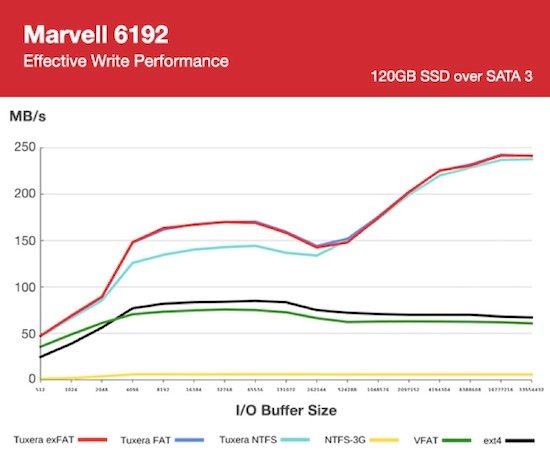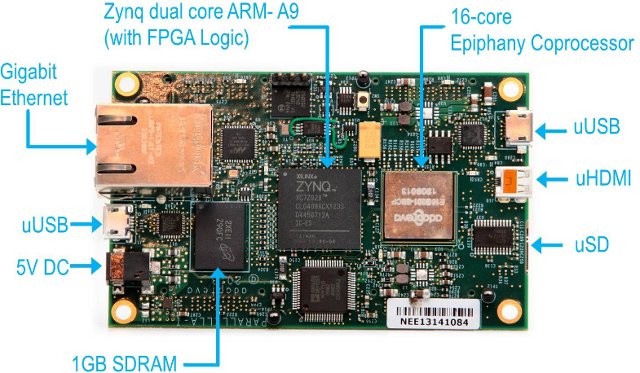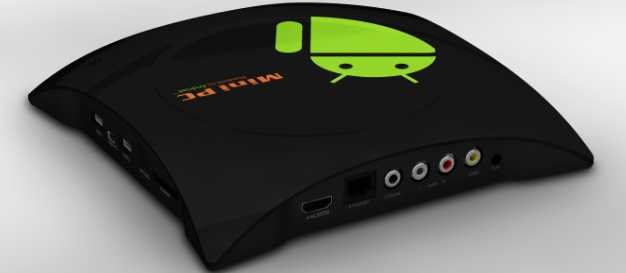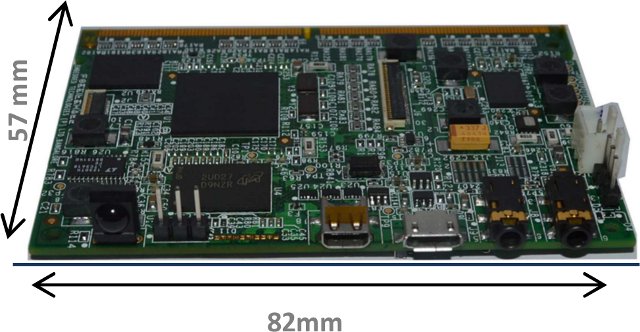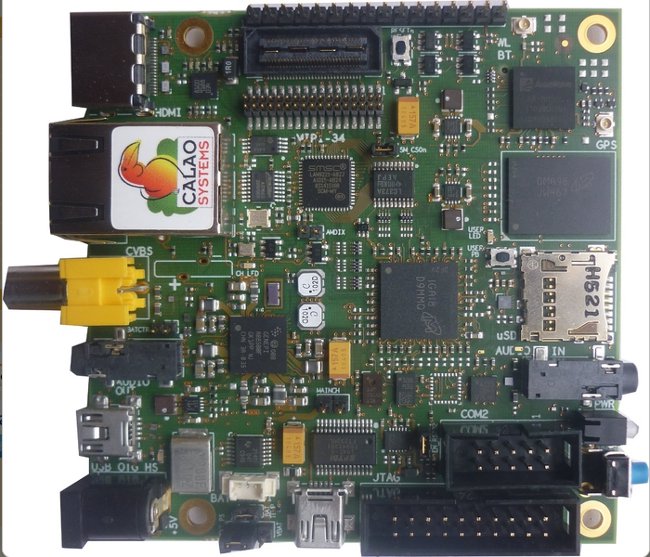Linus Torvalds has announced the release of Linux Kernel 3.10: So I delayed this by a day, considering whether to do another -rc, but decided that there wasn’t enough upside. Sure, it hasn’t been as quiet as I’d like, and we had this long discussion about an inode list locking scalability issue over the last week or two, but in the end that issue turned out to not be new, and while we may end up back-porting the eventual resolution to 3.10, it wasn’t a reason to delay the release. Similarly, while I might wish for fewer pull requests during the late rc’s (and particularly the ones that came in Friday evening -inconvenient for a weekend release), at some point delaying things doesn’t really help things, and just makes the pent up demand for the next merge window worse. In other words, I could really have gone either way, but […]
Tuxera FAT Embedded Boasts Faster and Better FAT32 Implementation for Embedded Linux and Android
Tuxera has announced their “FAT Embedded” implementation of the FAT file system specifically optimized for embedded Linux and Android. The company claims their commercial solution delivers much faster data transfers than competing FAT implementations. Beside providing better performance, it also includes features such as fail-safe operation, and lower power consumption. They’ve benchmarked different file systems including Tuxera FAT Embedded with different I/O buffer sizes on two embedded hardware: Marvell 6192 @ 800 MHz with 512 MB RAM and a 120 GB Corsair Force GT SSD (SATA 3) The write speed of Tuxera exFAT and FAT appears to clearly outperform even ext-4 in this particular system. As a side note, I also evaluated 2 embedded systems based on the same low-end CPU: one using NTFS-3G, and the other Tuxera NTFS back in 2010, and there’s was a massive performance difference at the time. NTFS-3G is a different beast as it uses […]
$99 Parallella Supercomputer is Now Open Source Hardware
Parallella is a low cost supercomputer designed by Adapteva using Xilinx Zynq-7010/7020 FPGA+2x Cortex A9 SoC combined with Adapteva Ephipany 16 or 64 cores epiphany coprocessor. The project had a successful kickstarter campaign which allowed then to provide the 16-core version for $99, and the 64-core version for $750. The board will soon be shipped to people who pledged on kickstarter, and one of the promise of the campaign was to fully open source the platform, and today, they just fulfilled that. Before going into the details of the open source release, let’s have a look at the specs: SoC – Xilinx Zynq7000 Series (Z-7010 or Z-7020) Dual-Core ARM Cortex A9 with 512KB L2 Shared Cache Coprocessor – Epiphany Multicore Coprocessor. The Parallella-16 board includes the 16-core Epiphany-III processor The Parallella-64 board includes the 64-core Epiphany-IV processor System Memory – 1024MB DDR3L Boot Flash – 128 Mb QSPI Flash Indicators […]
JW-11 Android or Linux Media Player Supports Internal 2.5″ Hard Drive
If you’re not simply watching movie streamed from the Internet, one way to store your media files is in a NAS, and another way is to store directly into your media player with an Hard drive. Unless you run a SAMBA or NFS server within your media player, you may lose the ability to access your files from several devices, but by playing directly from the hard drive, you are sure any video will be played smoothly. There are few low cost set-top box that support SATA, and the ones that do, such as Mele A1000 and its successors, simply offer an external SATA connector leaving your hard drive without protection from dust. I’ve just noticed there’s a low cost solution with an internal HDD enclosure thanks to an Android set-top box powered by Amlogic AML8726-M3 called either JW-11 or Slav, and maybe some other names I’ve missed. Here are […]
FossilShale FS-DM385-SOM Features TI DaVinci SoC for HD Media applications
FossilShale, an embedded company based in Bangalore, has announced a system-on-module based on Texas Instruments Davinci TMS320DM385 SoC that targets applications high-definition decoding and encoding (up to 1080p60) such as IP Cameras, HD video conferencing endpoints, digital signage, portable medical imaging and diagnostics, or camcorders. It can be used standalone for evaluation, or with a carrier board. FS-DM385-SOM Specifications: SoC – Texas Instruments TMS320DM385F ARM Cortex A8 core @ 1GHz with HDVICP v2 video core handling H.264 BP/MP/HP, MPEG2, VC1, MPEG4 SP/ASP, JPEG/MJPEG encoding and decoding. Memory – 1GB DDR3 Storage – 512MB NAND flash +1x Micro SD/MMC connector (up to 32GB) Audio / Video: 1x HDMI Out (Micro) 1x LCD TFT Interface (24 Bit RGB) 1x Camera Interface (MIPI) 1x Integrated Composite Video In & Audio Line In(Stereo Jack) 1x Integrated Composite Video Out & Audio Line Out(Stereo Jack) Other Interfaces: 1x USB OTG 1x IrDA Accelerometer 1x I2C, 1x SPI […]
Snowball Board Phased Out, and Offered at a Discount
Snowball is a mobile development board based on ST Ericsson Nova A9500 dual core ARM Cortex A9 SoC , which was officially supported by Linaro (they still released Android and Ubuntu images), and designed by Calao Systems, but since ST-Ericsson venture fell apart, support for the board has been discontinued, and the developer’s community (igloocommunity) has recently been closed down. The last message of the mailing list (now not accessible) reads as follows: A small team of passionate ST-Ericsson people have dreamed about Snowball and they makes it possible. Since December 2011 after a management change, it has been difficult to maintain the program, but with your support, we succeed until this time. Nevertheless, you have been able to demonstrate the pertinence of this program, and its great potential with impressive realizations. In December 2012, STMicroelectronics announced a new strategic plan, where STM takes the decision to exit ST-Ericsson. Then […]
Linaro 13.06 Release With Linux Kernel 3.10 and Android 4.2.2
Linaro 13.06 has been released with Linux Kernel 3.10-rc6 and Android 4.2.2. Linux Linaro Stable (LSK) preview is based on kernel 3.9.6. There seems to have been a lot of activity for the LAVA and Builds and Integration teams, with LAVA support for new SoC such as Huawei K3V2 and Broadcom Capri from 2 companies which have recently joined Linaro as members, and well as continuous build for Linaro Stable Kernel. On the kernel side, more work has been done for multi-platform support (unified kernel), uprobes, eMMC power mamangement, and more. Here are the highlights of this release: LAVA LAVA Core As part of the effort to improve the developer experience with LAVA, the different client tools were consolidated into a single package, which simplifies the process of updating the tools and makes it easier for the team to provide new features for LAVA users. LAVA now supports KVM devices, […]
MINIX MINI HD PC Based on Intel Atom D2550 Sells for $119
MINIX MINI HD PC is a barebone x86 computer without RAM or hard disk that has been announced last year, and it has just come to my attention that the system sells for just $119 on Geekbuying (excluding shipping), so once you add (up to 4GB) DDR3 RAM, and a SATA hard drive, you may have a basic x86 Linux or Windows system for about $200. MINIX MINI HD PC specifications: CPU – Intel dual-core (4 threads) D2550 processor @ 1.86GHz Chipset – Intel NM10 GPU – Intel GMA 3600 Series System Memory – 2x 1.5V DDR3 @ 800/1066MHz SO-DIMM sockets supporting up to 4GB of system memory (GeekBuying reports that “8GB (4GB x 2) memory is supported unofficially, stability will not be guaranteed by Intel”) BIOS – 1 x 16Mbit flash with AMI BIOS. Supports Plug & Play, Advanced Power Management ACPI, STR, CPU temperature, Fan speed, System Voltage […]



